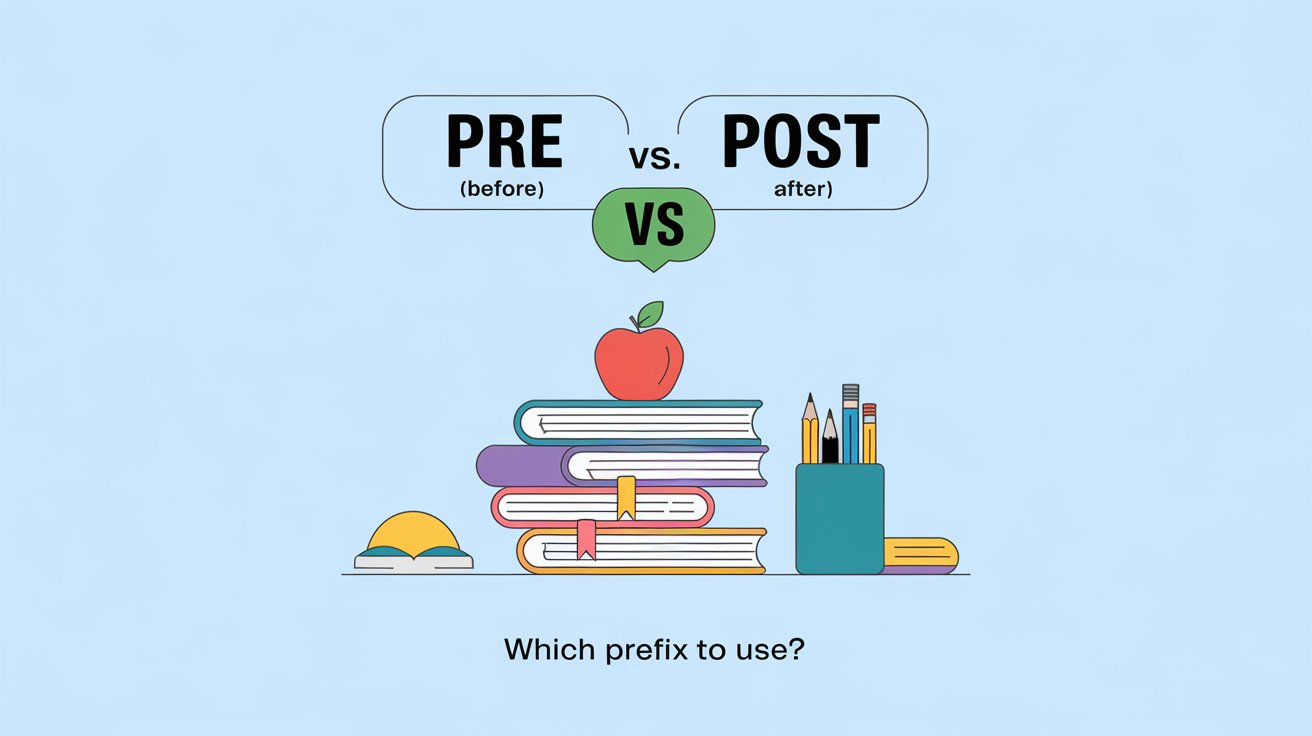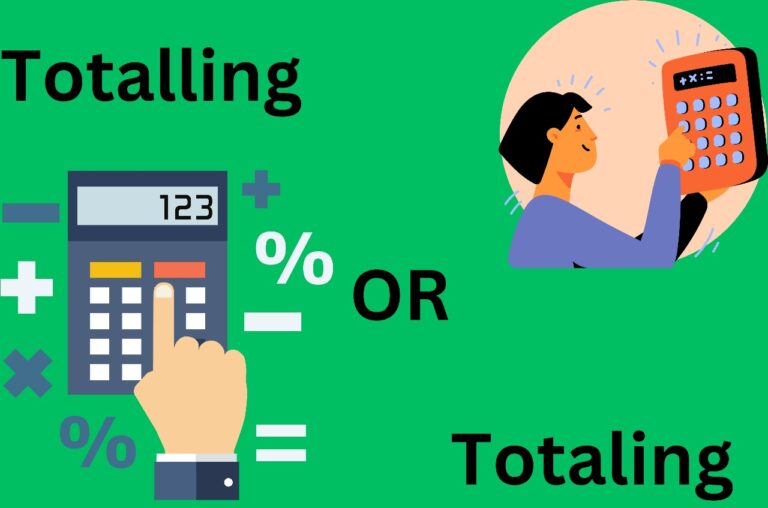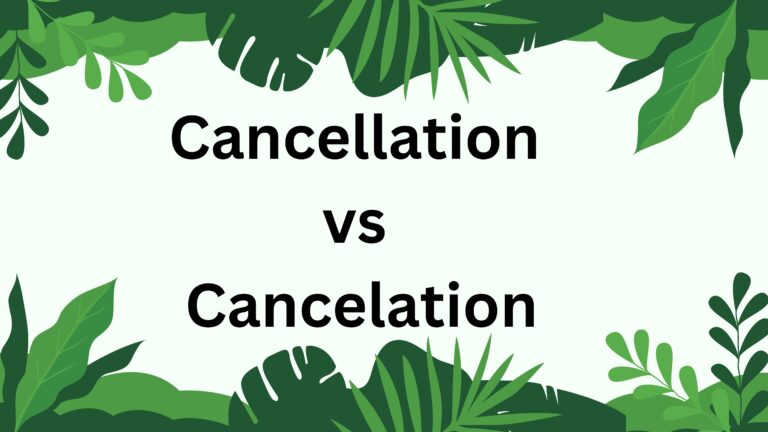Pre vs Post: Which Prefix to Use?
Deciding between the application of the prefixes “Pre vs Post: Which Prefix to Use?” is usually confusing, but knowing what they are will make it simple. “Pre-” is something that occurs prior to an event, and “post-” is something that occurs after. These two prefixes are applied across all common languages, from pre-workout to post-graduation. In this post-reveal, we will clear the air of their differences, present examples, and demonstrate how you can use one instead of the other in certain situations. So let’s start.
Tiny Prefixes, Big Impact
Prefixes "pre-" and "post-" help define time in writing. Here’s a quick breakdown:
"Pre-" means before, setting things up for what’s ahead (e.g., pre-meeting prep).
"Post-" means after, dealing with outcomes (e.g., post-workout recovery).
Pre and Post: Tiny Words, Big Impact!
In English, “pre-“ and “post-“ are prefixes—small additions that change a word’s meaning. “Pre-“ means before (e.g., pre-game warm-up), while “post-“ means after (e.g., post-workout recovery). These tiny prefixes help define timing and enhance clarity in communication.
Understanding Pre and Post:
- Pre: The prefix “pre-” means before or earlier, signaling something that happens ahead of time. It sets the stage for what follows.
- Example: Pre-book your tickets to secure your seat. (Booking happens before the event.)
- Post: The prefix “post-“ means after or later, indicating something that happens afterward. It reflects on the results or consequences of an event.
- Example: Post-workout stretching helps with recovery. (Stretching happens after exercising.)
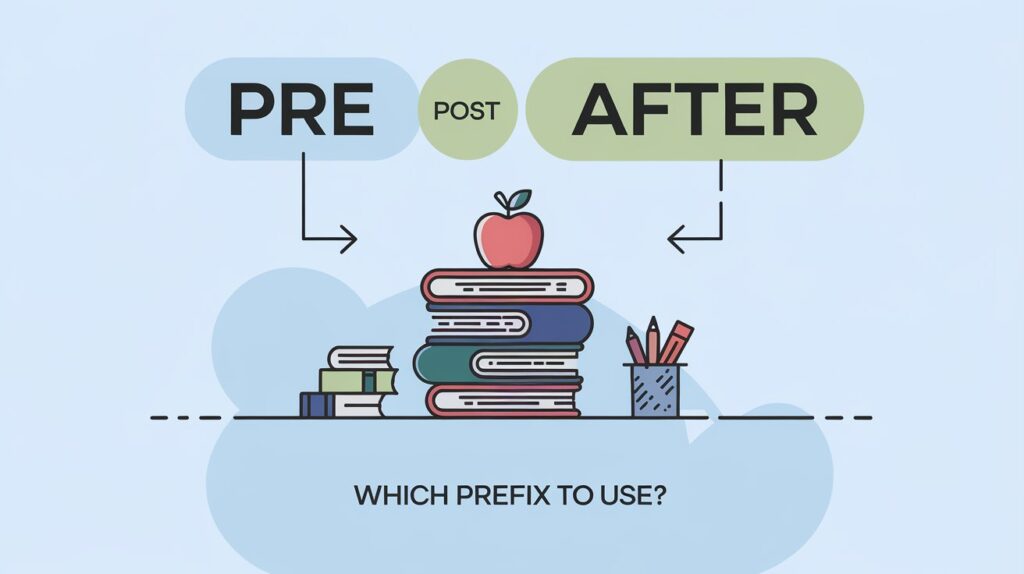
While Handy, Not Quite Antonyms
Though “pre-“ and “post-“ indicate timing, they aren’t exact opposites. “Pre-“ sets things up beforehand, while “post-“ deals with what follows but not everything has both a pre and post version. These prefixes add clarity but don’t always create direct antonyms.
Let’s Get Practical!
Here are some examples to better understand “pre-“ and “post-“:
Pre-order means ordering something before it becomes available, like booking a book or gadget ahead of its official release.
Postpone means delaying or rescheduling something for a later time, like moving a meeting or event to a future date.
Pre-requisites are requirements that must be met before progressing, like completing a basic course before enrolling in an advanced one.
Post-surgical refers to the care or recovery period after a surgery, including follow-up treatments, rest, and medical check-ups.
Mnemonic:
“Pre-” means before
Preheat the oven before baking.
“Post-” means after.
Post-workout stretching aids recovery.
Prepare first" and "Postscript follows" help you remember when to use each prefix.
Pre vs Post: The Differences Made Clear
The prefixes “pre-“ and “post-“ may be small, but they have a big impact on meaning. “Pre-“ refers to something happening before an event, while “post-“ indicates something occurring after. Understanding these prefixes helps improve clarity in communication. In this article, we’ll break down their differences with examples to make them easy to remember!
Timeline:
- comes next Pre: The prefix “pre-“ signifies something happening before an event or action. It highlights preparation, planning, or steps taken in advance. Whether it’s preheating an oven, preparing for an exam, or pre-registering for an event, understanding “pre-” helps us organize tasks ahead of time efficiently.
- post: The prefix “post-” refers to things that happen after an event or action. It highlights follow-ups, reflections, or consequences. Whether it’s post-workout recovery, post-surgery care, or post-event feedback, “post-” helps us understand what crafter the main event.
Function:
- “Pre-“ indicates something happens before an event (pre-training = preparation before practice).
- “Post-“ refers to something occurring after an event (post-exam review = analysis after a test).
Remember:
- “Pre-” = Before, setting things up.
- “Post-” = After, reflecting on what happened.
| Feature | Pre | Post |
| Meaning | Before | After |
| Function | Sets the stage, establishes anticipation, or prepares for a future event | Reflects on the aftermath or consequences of something that has already happened |
| Timeline | Signals events or actions that take place before something else | Indicates events or situations that occur after something else |
| Grammar | Attaches to the beginning of a base word | Attaches to the beginning of a base word |
| Examples in Education | Pre-test preparation (studying before an exam)Pre-enrollment counseling (guidance before joining a course)Pre-requisite courses (classes required before advancing to another level) | Post-test review (analyzing answers after an exam)Post-graduation plans (career or further studies after completing a degree)Post-course feedback (evaluation given after finishing a course) |
| Examples in Medicine | Pre-operative instructions (guidelines to follow before surgery)Pre-diagnosis symptoms (signs observed before confirming a condition)Pre-natal care (medical care before childbirth) | Post-operative care (recovery measures after surgery)Post-diagnosis treatment (care provided after identifying an illness)Post-natal care (care given to a mother and baby after childbirth) |
| Examples in Business & Finance | Pre-launch marketing (promotions before releasing a product)Pre-approval for loans (approval before the final decision)Pre-order sales (purchases before a product’s release date) | Post-launch analysis (review of performance after a product release)Post-payment confirmation (verification after a transaction)Post-investment returns (profits gained after an investment matures) |
| Examples in Daily Life | Pre-dawn workout (exercise before sunrise)Pre-trip checklist (things to prepare before traveling)Pre-wedding photoshoot (photos taken before the wedding ceremony) | Post-sunset walk (a stroll after the sun goes down)Post-travel unpacking (organizing belongings after a trip)Post-wedding reception (celebration after the wedding vows) |
| Analogy | Think of it as a miniature prologue condensed into a single syllable | Think of it as a tiny epilogue tag attached to your word |
| Relationship | Not true antonyms (precedes vs. follows, not direct opposites) | Not always a perfect counterpart to “pre-” |
| Sentence Clarity | Emphasizes the importance of what’s to come | Highlights the results or later stages of a situation |
Origins of ‘Pre’ and ‘Post’
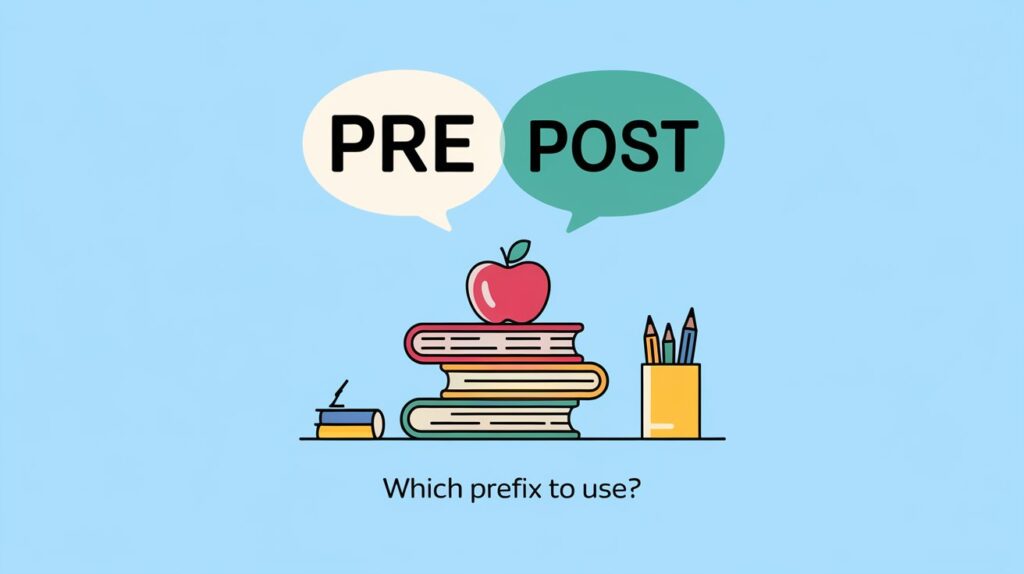
Pre–
comes from the Latin word pre, meaning “before” or “in front of.” It is used to describe events or conditions that happen earlier. Examples include prehistoric (before recorded history), preview (a look at something before release), and prepaid (paid in advance).
Post–
comes from the Latin word post, meaning “after” or “behind.” It refers to events occurring afterward. Examples include postgraduate (after earning a degree), postpone (to delay something), and postwar (after a war).
Bonus Fun Fact:
Even though “pre” means before and “post” means after, they actually share a common origin! Both prefixes trace their roots back to the ancient Proto-Indo-European root "*per-", which meant "forward" or "beyond." Over time, these words evolved in different directions, giving us the time-related meanings we use today. Language is full of surprises, isn’t it?
Examples in Context
Per–
- Preheat the oven before baking those delicious cookies. (Before baking, we need to heat the oven.)
- Preorder the newest game to guarantee your copy on release day. (Before the game is available, you can secure it in advance.)
- Pre-med students take rigorous courses to prepare for medical school. (Before applying, they complete specialized training.)
- Preplan your vacation itinerary to avoid last-minute stress. (Before traveling, organizing details ensures a smooth trip.)
- Prepay your phone bill to keep uninterrupted service. (Before using the service, payment must be made in advance.)
- Preapprove your loan application to speed up the home-buying process. (Before purchasing, getting approval makes financing easier.)
Post:
- Postpone the meeting if the key members can’t attend. (After scheduling, you may delay it to a later time.)
- Postwar economies often experience rapid changes. (After a war, countries go through economic shifts.)
- Postgraduate students continue their studies after earning a degree. (After completing undergraduate studies, they pursue advanced education.)
- Postproduction is where the real magic happens in filmmaking. (After shooting, editing and special effects are added.)
- Postmortem analysis helped determine the cause of the failure. (After an event, an in-depth review provides insights.)
- Postscript (P.S.) I forgot to mention—I’ll see you next week! (After finishing a letter, you can add extra notes.)
Bonus Tip:
Did you know that "pre-" and "post-" can sometimes team up to create even more precise terms? Take "pre-postoperative care".it refers to the medical attention given before and after surgery! Understanding words with "pre-" and "post-" not only helps with meaning but also reveals their fascinating evolution through history. So, the next time you see one of these prefixes, you’ll know it’s more than just a word, it's a glimpse into how language shapes our understanding of time.
A Final Look:
The adjectives “pre-” and “post-” are verbal dynamite, giving us the power to communicate time, preparation, and consequence using only a few letters. “Pre-“ is that which happens before something occurs, and “post-” is that which happens afterward. From preheat (heating in advance) to postpone (delaying), these small prefixes shape our words.
More fascinating still, there are words that possess both like “pre-postoperative care,” speaking to medical treatment before and after surgery. Language is always on the move, and these prefixes serve as a reminder that words contain history, meaning, and specificity.
If you want to explore whole site Click Here
FAQ : Pre vs Post
What do “Pre” and “Post” mean?
“Pre-” means before or earlier than something.
“Post-” means after or later than something.
What is the difference between “Pre” and “Post”?
“Pre” refers to something happening before an event (e.g., pre-meeting notes – notes before a meeting).
“Post” refers to something happening after an event (e.g., post-lunch nap – a nap after lunch).
What does “Post vs Pre” mean?
It is a comparison between “Post” (after) and “Pre” (before), often used to describe events, conditions, or actions relative to a specific point in time.
How are “Pre” and “Post” used in grammar?
Both are prefixes added to words to modify their meaning:
Pre-: Pretest (a test before the actual test), Prepaid (paid in advance)
Post-: Postgraduate (studies after graduation), Postpone (delay something to a later time)
Can you give some common pre- and post- examples?
Pre-: Preschool (before school), Pre-order (ordering before release)
Post-: Postwar (after a war), Postscript (P.S. – an additional note after a letter)
What is the grammatical function of “Pre-” and “Post-“?
“Pre-” and “Post-” are prefixes, meaning they are attached to the beginning of words to change their meaning. They do not function as standalone words.
What’s the importance of understanding “Pre” and “Post”?
Recognizing these prefixes helps in understanding the sequence of events and improves vocabulary, especially in academic, medical, and business settings.

